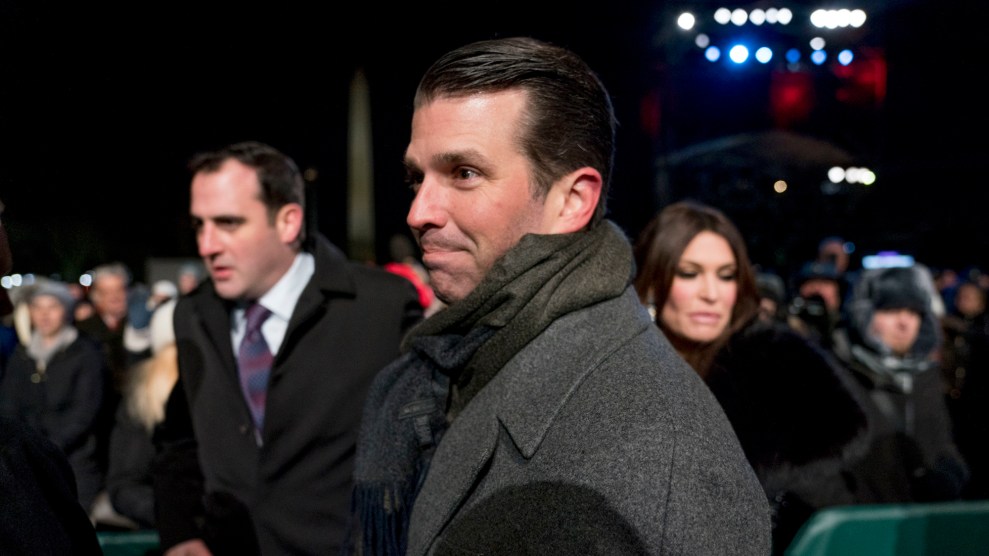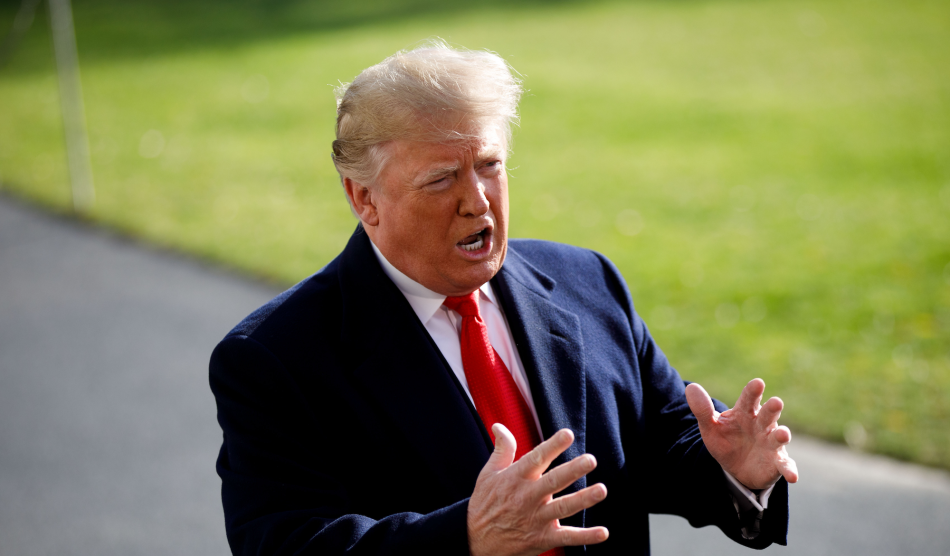
Donald Trump Jr. departs from the National Christmas Tree lighting ceremony.Andrew Harnik/AP Photo
This article was originally published by ProPublica.
Donald Trump Jr., the president’s eldest son, took a stake last year in a startup whose co-chairman is a major Trump campaign fundraiser who has sought financial support from the federal government for his other business interests, according to records obtained by ProPublica.
The fundraiser, Texas money manager Gentry Beach, and Trump Jr. attended college together, are godfather to one of each other’s sons and have collaborated on investments—and on the Trump presidential campaign. Since Trump’s election, Beach has attempted to obtain federal assistance for projects in Asia, the Caribbean and South America, and he has met or corresponded with top officials in the National Security Council, Interior Department and Overseas Private Investment Corporation.
Beach and others at the startup, Eden Green Technology, have touted their connections to the first family to impress partners, suppliers and others, according to five current and former business associates. Richard Venn, an early backer of Eden Green, recalls the company’s founder mentioning “interest from the Trump family.” Another associate said Beach bragged about his ties to the Trumps in a business meeting.
The investment is one of just a handful of known business ventures pursued by Trump Jr. since his father moved into the White House almost two years ago. In addition to being a top campaign surrogate and public booster, Trump Jr. serves as an executive vice president of his father’s company and one of just two trustees of the trust holding the president’s assets.
Ethics experts have consistently criticized these arrangements, arguing that they invite those seeking to influence the government to do so by attempting to enrich the president or his family members with favorable business opportunities.
Trump Jr. invested in the startup, a company that grows organic lettuce in a hydroponic greenhouse, last year, records show. Those records don’t state how much money—if any—Trump paid for his 7,500 shares. But the shares would have been worth about $650,000 at the end of last year, based on a formula used by another shareholder in a recent court filing. Neither Trump Jr. nor the company have disclosed his investment publicly. Trump Jr. obtained the stake through a limited liability company called MSMDF Agriculture LLC, which was set up by a Trump Organization employee last fall.
The key ethical question, said Virginia Canter, chief ethics lawyer at the nonprofit Citizens for Responsibility and Ethics in Washington, is whether Beach’s involvement with Eden Green, and Trump Jr.’s investment in it, are based on the business merits—or on the possibility of cashing in on connections to power. “Why is Trump Jr. being given this opportunity?” she asked. “It definitely has the appearance of trying to gain access by any means to curry favor with the administration.”
The willingness of Eden Green to invoke the Trump name in its business dealings raises further ethical concerns, experts said, particularly if potential customers understand that they are giving contracts to a startup whose success could enrich the president’s son.
Neither Trump Jr. nor his spokesman responded to messages seeking comment on his relationship with Beach and investment in Eden Green. A White House spokeswoman didn’t respond to emailed questions. Alan Garten, the Trump Organization’s top lawyer, said in a statement that Trump Jr.’s investment is a personal one. The entity through which it was made “is not owned or controlled by, or affiliated in any way with, The Trump Organization,” Garten said.
Last fall, Eden Green concluded a deal with Walmart. Today, the giant retailer sells the company’s lettuce, kale and other greens at about 100 stores in the Dallas-Fort Worth region. (Eden Green’s sole facility is a 44,023-square-foot greenhouse outside Fort Worth, where it grows the greens in 18-foot vertical tubes.)
Walmart interacts with government regulators on an array of matters—everything from labor practices and land use to securities filings—but there is no indication that Walmart is aware of Trump Jr.’s connection to Eden Green. (Separately, Walmart contributed $150,000 to Trump’s inaugural committee. Beach was a finance vice chair of that committee, but a Beach spokesman says he has never met with Walmart executives.)
Molly Blakeman, a Walmart spokeswoman, declined to comment on Eden Green or its investors. “We don’t talk about our relationships with our suppliers,” said Blakeman, who added that Walmart has “supported inaugural activities” in the past.
Andrew Kolvet, a spokesman for Beach and the other Eden Green executives, said it’s “categorically false” that the Trump name was invoked by Eden Green officials. Kolvet cited a corporate policy that forbids discussing investors “with any current or potential client.” He also said Trump Jr. isn’t involved with company operations and bought into Eden Green during “U.S. friends and family fundraising efforts.”
A recent lawsuit asserts that Eden Green is in financial trouble. In October, the company’s largest shareholder, an entity controlled by a wealthy oil and gas family from Midland, Texas, filed suit in state court in Dallas, alleging “gross project mismanagement.” The suit accused Beach and six executives, all of them board members, of paying themselves extravagant salaries (allegedly $250,000 to $300,000 per year) and putting the company “on the precipice of failure.” A financial consultant hired to examine the company’s books asserted that Eden Green executives spent more than $19.4 million in the first nine months of 2018—a daunting sum for a company that reported having raised a total of $22 million as of June—while generating $9,000 in revenues.
In late November, less than a month after the suit was filed, it was settled on confidential terms. Kolvet disputed the compensation figures asserted in the litigation, saying that the company’s pay is “in accordance with industry standards.” He maintained that Eden Green’s prospects are good. As with many startups, he said, “things don’t go in a straight line.” Kolvet asserted that the company has plenty of operating cash.
Trump Jr., now 40, and Beach, now 43, met at the University of Pennsylvania two decades ago. Both are the sons of wealthy businessmen, one in real estate, one in oil and gas. Beach’s father has since been laid low: Last month he was sentenced to four months in federal detention, plus two years of supervised release, for bankruptcy fraud.
Beach was a groomsman at Trump Jr.’s wedding (Trump Jr. and his wife recently separated). Beach and Trump Jr. like to hunt and once considered buying a hunting preserve in Mexico together. According to a 2010 deposition testimony by Trump Jr., they talked business during lunches at Rothmann’s steakhouse in New York.
Both have struggled in business at times. In 2009, Trump Jr. and others (including one person who pleaded guilty to an unrelated criminal fraud charge in 2010) formed a company that would sell concrete panels for home constructions out of a warehouse in North Charleston, South Carolina. The business quickly became mired in lawsuits seeking payment for unpaid bills. Trump Jr. made the situation more precarious by personally guaranteeing a $3.7 million loan for the project. Days before the note was due, the Trump Organization purchased the debt, eventually taking over the warehouse and selling it all back to Trump Jr.’s original business partner, according to press accounts.
For his part, Beach’s career path has also included some travails. He spent a year or so at Enron and then moved into finance. Beach worked for a hedge fund and remains locked in litigation with it more than a decade later. (He claims he wasn’t paid his full compensation; the fund claims he was “responsible for the destruction of millions of dollars of investor capital.”) Beach now runs a “family office focused on private equity investments” out of a Dallas office that Eden Green uses as its corporate address.
Trump Jr. has at least twice before invested with Beach in deals that didn’t pan out. Trump Jr. put $200,000 in a dry Texas oil well managed by Beach’s father, according to testimony by Trump Jr. He also lost an unknown sum in a failed African mining company affiliated with Beach’s uncle.
But Trump Jr. stuck with his friend. The Associated Press reported this year that the two formed a company last October to pursue technology investments.
Then there was Eden Green. By the time Trump invested last fall, the company had already run into problems. It first launched in 2013 in South Africa with an ambitious mission: to feed the world through a highly efficient indoor farming system deploying patented technology intended to yield 10 to 12 harvests a year, compared with two or three for conventional agriculture.
There’s a market for vegetables grown in controlled greenhouse environments as big retailers increasingly push for cleaner, more reliable and locally grown alternatives. But the challenges are significant. Energy costs run high, and there are myriad difficulties associated with scaling up to an industrial-size system.
That’s what happened in Eden Green’s first iteration, according to a half dozen early backers and associates. The produce may have been sustainable—but the business model wasn’t. The CEO of its European unit wrote in an October 2017 email obtained by ProPublica that the company had “been bleeding money and resources for almost 2 years now.” In the fall of 2017, Eden Green’s founders cemented a deal to hand over majority control to a group of U.S. investors led by Beach, current and former business associates said.
This was the company Trump Jr. bought into. He used an innocuous-sounding limited liability company, called MSMDF Agriculture LLC, to make the investment. ProPublica discovered MSMDF after the Trump Organization listed it in New York City filings among dozens of other entities it controlled. (Because the Trump Organization has contracts with the city to run the Wollman skating rink in Central Park and a golf course in the Bronx, the city requires the company to file disclosures.) The Trump Organization told ProPublica that MSMDF is not in fact owned by the Trump Organization but was included in the disclosure form because it’s controlled by Trump Jr., who was described in the form as MSMDF’s president, secretary and treasurer.
MSMDF was formed by a Trump Organization employee in September 2017 in Delaware, according to incorporation papers. Eden Green Holdings UK, Ltd., an affiliate of the Texas-based company, then listed MSMDF among its roughly two dozen shareholders in a 2018 report filed with British regulators.
The Trump Jr.-Beach connection has been most visible in the political arena. Last year, for example, Trump Jr. publicly thanked Beach and their mutual friend Tommy Hicks Jr., another wealthy investor from Dallas, for their fundraising during the 2016 campaign. “We couldn’t have done it without you guys,” Trump Jr. said of his buddies to a crowd of Republican donors in March 2017. “It was just absolutely incredible.”
In the foreword to a recent book, Trump Jr. reiterated the message, writing that a “rag tag army”—Trump Jr., Beach, Hicks and Charlie Kirk, the firebrand chief of the pro-Trump organization, Turning Point USA—barnstormed the country in 2016, raising “over 150 million dollars in ninety days.”
Since Trump’s election, Beach has met with top administration figures on multiple occasions. For example, according to the AP, he lobbied National Security Council officials to relax sanctions against Venezuela to create opportunities for U.S. companies. He attended a private lunch with Republican donors and Interior secretary Ryan Zinke.
Beach has denied leveraging his ties to the first family. Last month, Beach told a TV interviewer in Croatia, where he said he was exploring a “truly spectacular” $100 million real estate development, “I don’t need anything from the government, thankfully, except normal police protection in my hometown.”
But newly obtained emails show that Beach wanted government backing for his private business interests at the same time he was running Eden Green. In October 2017, Beach pitched Ray Washburne, who heads the Overseas Private Investment Corporation, a government agency that offers loans and guarantees to American companies looking to expand into emerging markets, according to emails obtained under the Freedom of Information Act. (Before joining OPIC, Washburne was a Dallas investor and a top fundraiser for Trump. He and Beach move in the same circles and have friends in common.)
“The Dominican Republic could really use some US investment and support,” Beach wrote in one email to Washburne, describing his various projects there, which included “a power plant upgrade to an existing tin mine” as well as liquid natural gas infrastructure. He invited OPIC officials to travel with him to the Dominican Republic “If permitted, we would be happy to handle all transportation from DC to DR and back,” he wrote in a follow-up note. (Such a trip never occurred, according to an OPIC spokesperson.)
A month later, the emails show, Beach also lobbied on another project, arranging a call with his business partner and one of Washburne’s top deputies regarding an “India Oppty,” which appeared to involve an energy fund. Separately, Beach also introduced Washburne to the head of oil giant Exxon Mobil’s Africa operations, with whom Beach said he had gone shooting at Blenheim Palace in England, where the Churchill family resided for three centuries. And Beach connected another Washburne aide with a South African mining executive who Beach described as “one of my partners.”
OPIC spokeswoman Amanda Burke said Beach has not submitted any formal applications for agency funding. “OPIC routinely meets with a variety of businesses and stakeholders,” she said, adding that formal applications trigger background and credit checks and “go through several levels of agency vetting and approval.”
Asked whether having a Trump connection would disqualify a person from receiving OPIC support, Burke emailed that “in general, an individual’s personal or legal business interests would not disqualify them from applying. However, certain relationships may cause board members or other decision makers of OPIC to be conflicted out of the decision-making process on potential projects.”








